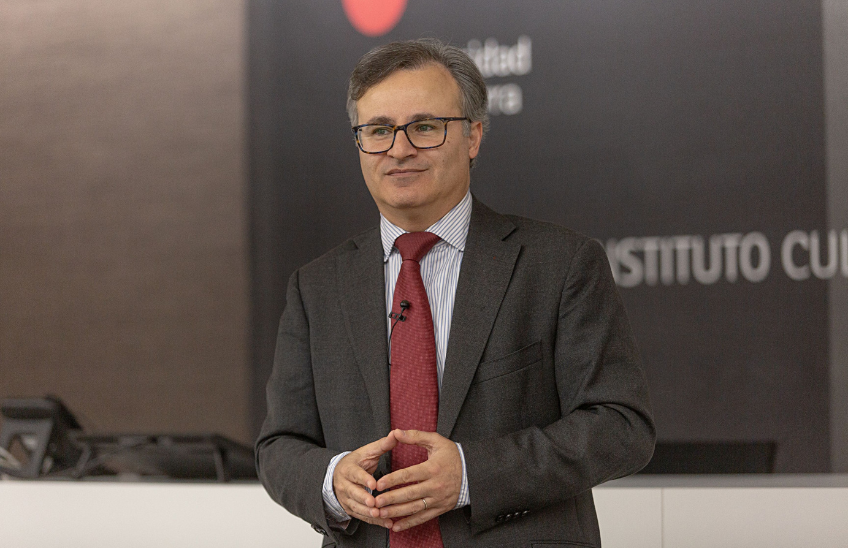"The war with Palestine is generating Israel's isolation."
The researcher of the Elcano Royal Institute, Haizam Amirah Fernández, inaugurated the Middle East Summit at the University of Navarra.

FotoManuelCastells/Haizam Amirah Fernández, during the session he gave at the University of Navarra, on the occasion of the Middle East Summit.
27 | 02 | 2024
The war between Israel and Palestine was the focus of the session that opened the Middle East Summit organized by the School Law School. With the degree scroll, Israel, Palestine, keys to the conflict and the risk of not resolving them, Haizam Amirah Fernández, the main researcher of the Elcano Royal Institute for the Mediterranean and the Arab World, explained to the students some of the main keys to understanding the conflict and the risk of not resolving it.
"All lives are worth the same, whether they are Israeli or Palestinian; any position that is put forward must be endorsed by the rules of international law and any call to hatred or crimes contemplated by the International Court of Justice in The Hague are unacceptable". Based on these three premises, Amirah Fernandez stressed that we are facing a conflict that broke out on October 7, with the Hamas attacks on Israeli territory, which is entrenched and in which since then there has been no de-escalation.
A conflict, she added, that is not only destabilizing the region but is also "blowing up common positions that until now have been maintained in other parts of the world, whether in the US or the EU". Amirah Fernandez explained that it is a status that is generating the isolation of Israel, a country that today is linked to terms such as apartheid or genocide. And she assured that more and more countries are positioning themselves in favor of the Palestinian cause and demanding a permanent ceasefire in the region.
In this regard, the researcher of the Elcano Royal Institute referred to the complaint filed by South Africa before the International Court of Justice, in which it is claimed that Israel may be committing genocide in Gaza. "For the first time in 76 years of conflict, the judges of the international court concluded on January 26 that there was evidence of genocide," he said.
Haizam Amirah Fernández referred to the war between Israel and Palestine as a territorial conflict. He made a historical review and spoke of the failure of previous attempts at peace in the region such as the Oslo agreements, with Yasser Arafat and Yitzhak Rabin; or the latest maneuver initiated under the US presidency of Donald Trump, with the Abraham agreements, of Israel's rapprochement towards some Arab countries in order to isolate Palestine. "Actually, the sequence is the opposite, he has commented, if Israel moves forward with a peace initiative with Palestine, it will be recognized by the 22 countries that make up the Arab League. Right now, only seven of those countries recognize the state of Israel," he noted. In the session, researcher of the Elcano Royal Institute also addressed the emergence and radicalization of Hamas.
Another of the characteristics highlighted by Amirah Fernandez to understand the conflict is the unconditional support of the Biden administration to Israel, despite the fact that this assumption is generating fissures among the youngest Democratic voters, with a view to the next elections in November. He has also warned of the extreme position maintained by the Israeli Prime Minister, Benjamin Netanyahu, and the increasingly probable risk of the displacement of millions of Palestinians to Egypt or Jordan, situations that could jeopardize the peace agreements that these countries maintain, for the time being, with Israel.




